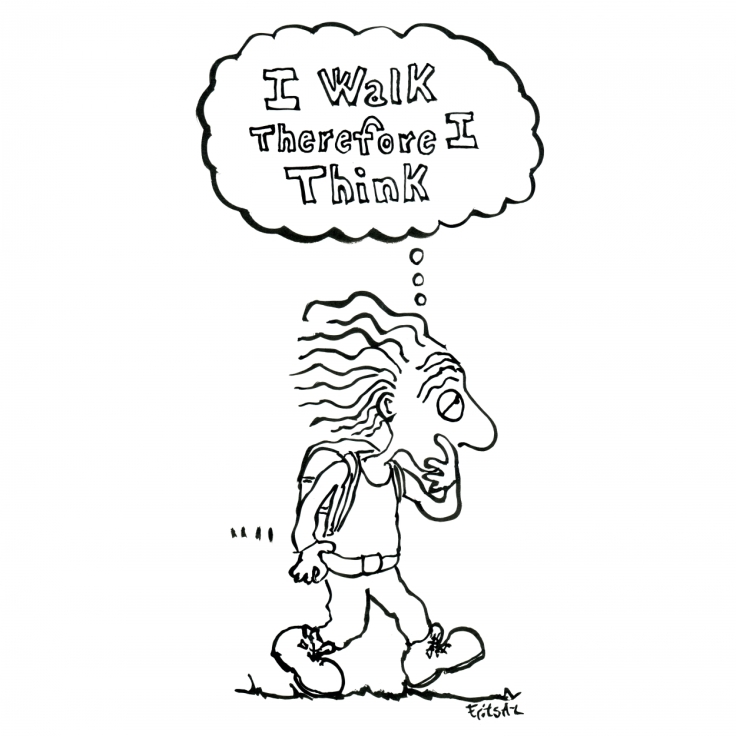What if someone were to claim that getting a dog would make that individual better at thinking? Contemporary research [1,2] suggests that aerobic exercise - including walking - improves cognitive performance. To cite Holly Schiff, walking leads to an increase of blood flow, which subsequently leads to improved cognition [3]. To re-connect with the original claim, it is common in today’s society for dog owners to “go for a walk with the dog” - thereby, transitively, dog owners will be exposed to situations in which cognition will show increased activity. Going back historically, many famous individuals like Aristotle from ancient Greece or Charles Darwin from Victorian England have been documented to go on walks to exhibit their “wanderlust” [4,5] - which in turn regarding the aforementioned modern research - might also suggest a contribution to how their achievements arose thereby classifying these people, from today’s perspective, as great minds. Nonetheless, evidence further suggests that it is not solely due to the physiological effect of walking per se but other aspects such as attention and rhythm while walking that stir human thinking [5]. In support of this view are people like Nassim N. Taleb who authored the best-selling book “The Black Swan: The Impact of the Highly Improbable”. The author, NNT, proudly depicts himself within said book as a vivid and pro-active walker - slow walker to be precise and in fact to quote him: “To become a philosopher, start by walking very slowly.” [6]. Ironically, walking itself requires a vast array of online computations for the period of the walk simply to perform all the required motoric commans, however, humans start walking from an early age - and like with many other things, take for instance driving a car - at some point of repetition said exercise becomes “second nature” i.e., it won’t require any actual conscious effort to perform, leaving room for the actual thinking [7]. Figure 1 depicts a sketch (or charicature) of the famous statement of french philosopher René Descartes “I think therefore I am” in spirit of the discussed topic on the connection between walking and thinking:
 |
|---|
| Figure 1: “I Walk Therefore I Think”. A sketch demonstrating the walking-thinking relation while referncing the famous René Descartes quote “I think therefore I am”. Courtesy Frits Ahlefeldt [8]. |
Considering the benefits (in addition to the cognitive benefits also the topic of general health benefits as has been long standing [9], yet not discussed in this article) in contrast to the low-cost of performance, one can make the argument that human schedule should generally make use of walking (e.g. going for a walk during lunch breaks is a growing-trend). For private enforcement, thinking of getting a dog might be a selfish- and absurd seeming yet sensible option (independent of benefits associated with owning a companion animal [10]). To end this article with a relevant quote of Friedrich Nietzsche from his original “Götzen-Dämmerung” [11] (or “Twillight of the Idols” in english): “Nur die ergangenen Gedanken haben Wert.”, which rougly translates to “only the thoughts that come from walking carry value”.
References
- A. M. Colmenares et al., “White matter plasticity in healthy older adults: The effects of aerobic exercise”, NeuroImage, 2021.
- A. F. Kramer & S. Colcombe, “Fitness Effects on the Cognitive Function of Older Adults: A Meta-Analytic Study-Revisited”, Perspectives on Psychological Science, 2018.
- J. Anderer, “New Study Reveals a Huge Side Effect of Walking More”, Eatthis.com, 2021.
- J. Jones, “How Walking Fosters Creativity: Stanford Researchers Confirm What Philosophers and Writers Have Always Known”, Open Culture, 2015.
- J. Stillman, “The Science of Why You Do Your Best Thinking While Walking”, Inc.com, 2016.
- V. Norris, “A Walk Through Paris With Nassim Nicholas Taleb”, HuffPost, 2011.
- Wikipedia, “Automaticity”, 2021.
- F. Ahlefeldt, “Walk to think”, 2017.
- Better Health Channel, “Walking for good health”, 2021.
- W. Bumgardner, “Maximize Your Lunchtime Walk”, verywellfit, 2021.
- Michigan State University, “The Health Benefits of Owning a Companion Animal”, 2018.
- Wikipedia, “Götzen-Dämmerung oder Wie man mit dem Hammer philosophirt”, 2021.